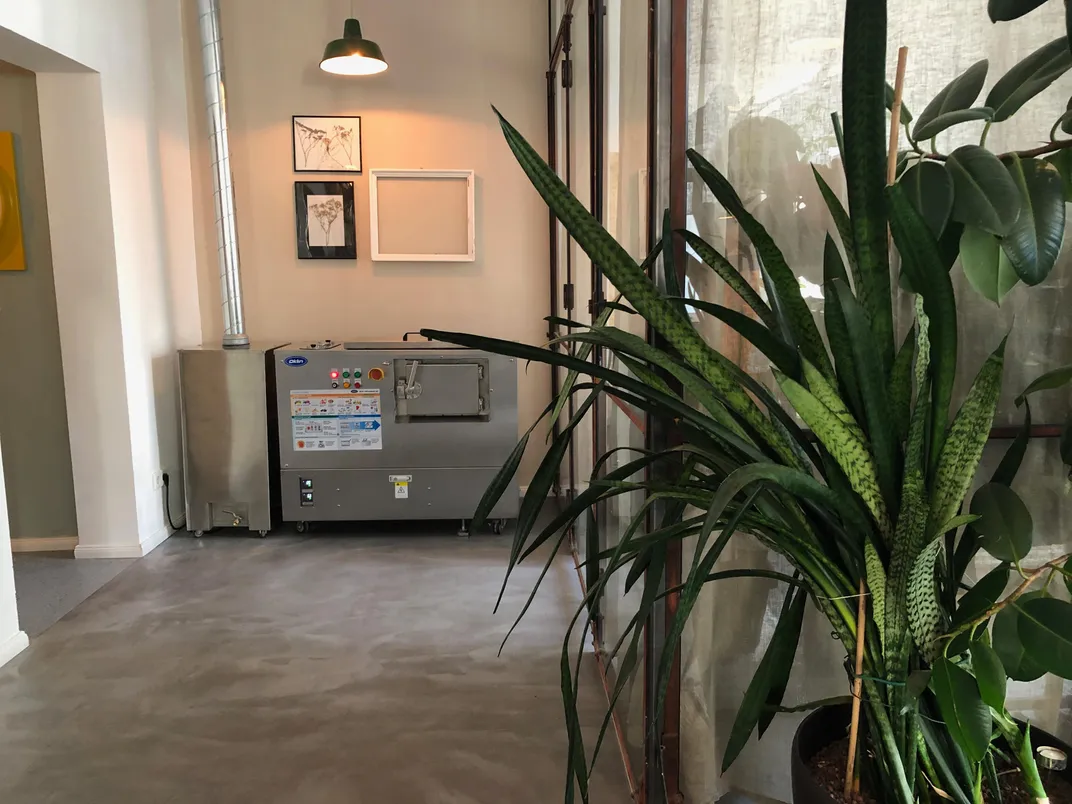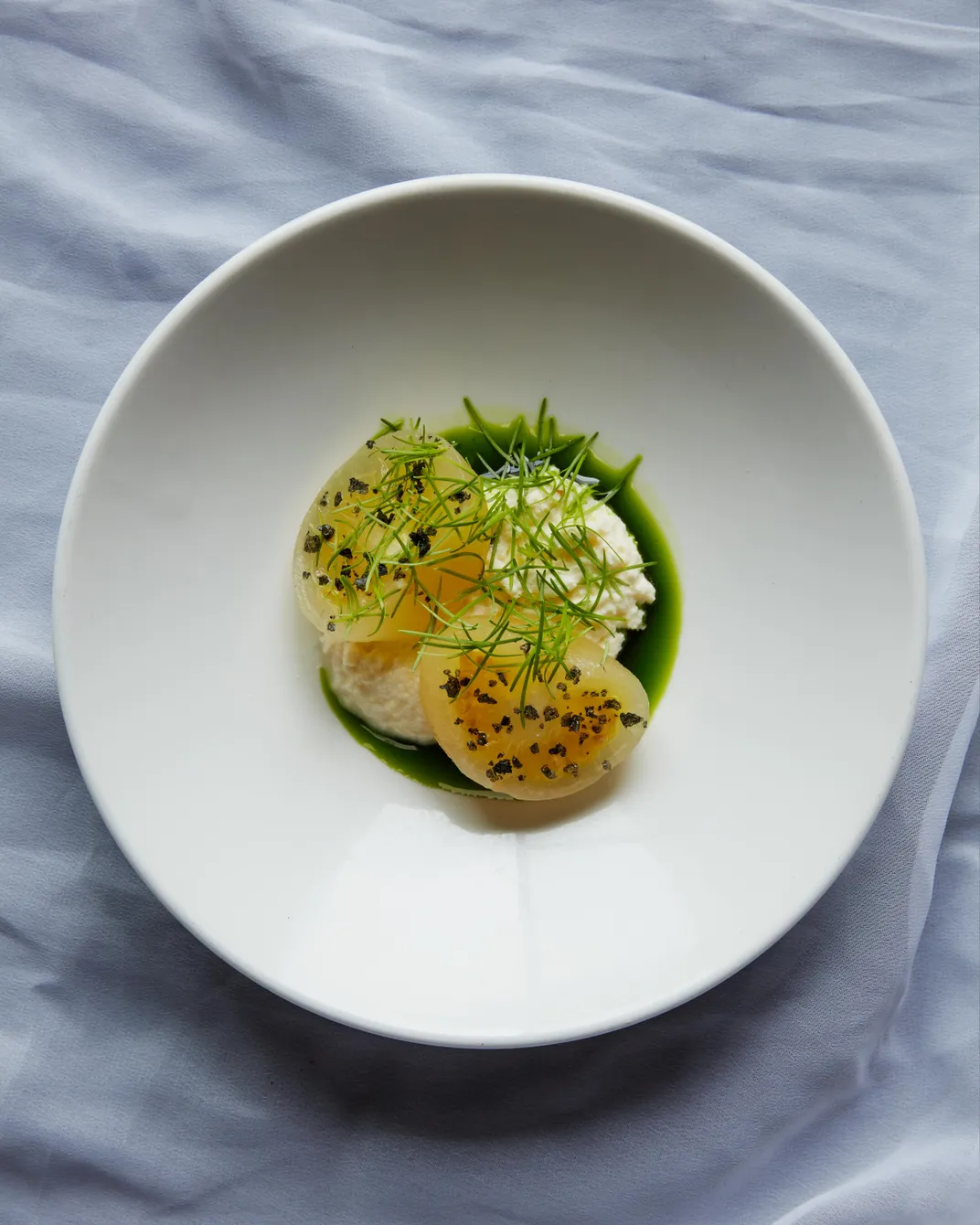The Rise of ‘Zero-Waste’ Restaurants
A new breed of food establishment is attempting to do away with food waste entirely
/https://tf-cmsv2-smithsonianmag-media.s3.amazonaws.com/filer/44/2b/442b2833-0cbc-456d-9f2e-51caa5117526/bildschirmfoto_2019-06-11_um_145057_kopie.png)
The restaurant and wine bar Rhodora, in Brooklyn, does not have a trash can. They don’t need one. While hauling bags of dripping trash to the alley is a least-favorite chore for dishwashers and bussers around the world, Rhodora simply doesn’t generate anything to throw away. They don’t allow any type of single-use plastic. They use a shredder to turn cardboard wine boxes into compost material. Corks are donated to an organization that uses them to make sustainable shoes.
Rhodora, which opened last year, is one of a small but growing number of “zero-waste” restaurants around the world. These establishments aim to avoid not only food leftovers, but also any scrap of trash. Though the term "zero-waste" is often used loosely, there are several organizations offering certifications for businesses that reduce their waste by a dramatic amount.
“Food waste has been gathering real momentum as an issue for restaurants over the last ten years or so,” says Andrew Stephen, CEO of the Sustainable Restaurant Association, a UK-based organization that helps food businesses become more environmentally responsible. “With…food waste globally accounting for 8 percent of greenhouse gas emissions, the environmental case is compelling.”
In the United States, food waste and packaging account for nearly half of the material sent to landfills. Though restaurants from McDonald’s to Starbucks are nodding to environmental concerns with “no straw Mondays” and reductions in single-serving plastics, it’s only a drop in the bucket. So a handful of restauranteurs are going all-in, trying to get rid of trash entirely. There’s an economic case to be made for waste-reduction too. One study shows that restaurants save $7 for every $1 invested in anti-waste methods.
“Everybody’s realizing there has to be a change,” says David Johannes Suchy, co-owner of Frea, a year-old, zero-waste vegan restaurant in Berlin.
At Frea, guests dine on handmade gnocchi with salsify (a root veggie sometimes called “vegetable oyster” for its allegedly oysterish flavor) at tables made from reclaimed oak beams. The lampshades above the bar are made from mycelium, the threadlike part of a fungi. In the back is “Gersi,” the restaurant’s affectionate nickname for their composting machine. Any leftover bits of food can be turned into compost within 24 hours, which is then delivered back to supplier farms.

Avoiding food waste is the first and perhaps most obvious challenge for zero-waste restaurants. Chef Doug McMaster at London’s Silo, considered by some the finest zero-waste restaurant in the world, only serves a set menu. This eliminates the worry that one particular item—the cured mushroom stem? The braised dairy cow?—won’t sell well, and will thus spoil in the refrigerator. Composters are a necessity as well. Like Frea, Helsinki’s Nolla (meaning "zero" in Finnish) gives compost to its suppliers. Guests are welcome to take home a scoopful as well—a different kind of doggy bag. Nolla also has food-tracking software more commonly used among corporate food service companies to keep track of what sells and what rots.
The décor at this new breed of zero-waste establishment is a showcase for sustainable design. At Silo, plates are made from recycled plastic bags and tables from packaging waste. Wall light fixtures are made from crushed wine bottles while a ceiling fixture is crafted from dried seaweed. The bar stools are made from mycelium, purpose-grown in molds then baked until solid. They’re compostable, of course. At Frea, an enormous piece of wall art is made from melted plastic collected during the restaurant’s construction. At Nolla, gift cards are made with biodegradable poppyseed paper. Recipients can plant them in their gardens after use. Nolla also hosts occasional “blackout dinners,” where cooking is done without electricity on a live-fire grill and guests dine by candlelight.
Delivery packaging is historically the weak link for establishments attempting zero waste. Since major food suppliers generally ship their goods in disposable materials, zero-waste restaurants work with smaller, more local suppliers, which fit with their small footprint ethos anyway. At Rhodora, bread is delivered by bike in a bin from a Brooklyn bakery. Cheese is wrapped in beeswax paper. At Silo, all food is delivered in reusable crates, bags and buckets. If something comes packaged in disposable plastic by mistake, the chef will send it back. Nolla supplies its small farmers and producers with reusable containers. At Frea, oil is brought in buckets; extra oil is used for making flavored cooking oils to sell.

Back, for a moment, to the Rhodora’s lack of trash can. No matter how scrupulously you avoid waste, there are some things that are both unavoidable and hard to recycle. While reusable menstrual products like silicon cups are growing in popularity, restaurants obviously cannot mandate their customers use them. Rhodora has a collection bin from Terracycle, a company that claims “nearly everything we touch can be recycled,” in the bathroom for this issue.
Then, there's the challenge of cleaning products.
“Our dishwashing areas have all very high efficiency machines, but they need their cleaning products, and there are no ecological cleaning products,” says Frea’s Suchy. “The industry makes it really hard for us in some ways.”
As the zero-waste concept gains steam, there will inevitably be poseurs, or restauranteurs aiming to tap an eco-conscious customer base without putting in the real work.
Stephen offers some pointers on what to look for to make sure a restaurant has a genuine commitment to sustainability, whether or not they call themselves zero-waste.
“Check the menu for dishes that highlight use of the whole ingredient—whether that’s nose to tail, root to fruit or indeed tail to fin,” he says. A menu full of pickled and preserved items is also a sign of a chef “committed to extracting maximum value” from ingredients, he says. So is a menu with little—or no—meat and dairy.
“Sourcing and serving more veg-led dishes will significantly reduce a restaurant’s footprint and help diners use the power of their appetite wisely,” Stephen says.
Silo’s current menu only features one meat dish, while Nolla’s menu is about 1/3 vegan, 1/3 pescatarian and 1/3 meat. Rhodora serves no meat and focuses on small, preserved fish, such as spicy sardines, smoked mussels and cockles in brine, which are much more sustainable than larger ones because they grow quickly and don't need to be farmed. Frea, of course, is completely meat-, fish- and dairy-free.
“We think that the survival of the human race is not based on animal products,” Suchy says.
If our survival depended on Frea’s menu—handmade sourdough, herby stuffed pasta with saffron sauce, chocolate mousse with pickled apples—we think we’d be just fine.
Five Zero- (or Near-Zero) Waste Restaurants
west~bourne, New York
/https://tf-cmsv2-smithsonianmag-media.s3.amazonaws.com/filer/c0/b3/c0b33dd6-17a2-469f-8a82-421fde4a7543/westbourne.jpg)
At west~bourne, a California-inspired all-day café in New York’s Soho, zero waste means weighing each day’s compost, recycling and trash. Its owner hopes to earn a certification from Green Business Certification Inc., the organization in charge of verifying the LEED standards now ubiquitous in green building. Getting this certification involves paying for an assessment and proving you’ve kept 90 percent of your waste out of landfills and incinerators for at least a year. Dine on of-the-moment vegetarian dishes like chia pudding and grain bowls in the airy wood-and-exposed brick space—no meat means everything can be composted. Compost is then hauled away to fertilize veggies on an upstate farm, and the whole cycle begins again.
Seven Market Cafe, Seattle
/https://tf-cmsv2-smithsonianmag-media.s3.amazonaws.com/filer/7d/2e/7d2ed4ec-bae0-43ba-bf42-e052ede83d86/seven.jpg)
All the trash produced in a week at Seattle’s Seven Market Cafe can fit in a single mason jar. The popular café went zero-waste thanks to one of its baristas, a University of Washington student named Jacob Huskey who transformed his workplace as part of an independent study for his environmental studies degree. They’ve diverted 95 percent of their waste away from landfills by having food and coffee delivered in reusable bulk bins, getting rid of single-use items like sugar packets in favor of dispensers, and starting a “Little Mug Library” of reusable to-go cups—customers can just bring theirs back at the next visit.
Graffiti Earth, New York
/https://tf-cmsv2-smithsonianmag-media.s3.amazonaws.com/filer/e2/a0/e2a0eb74-039c-422f-81a3-669a1e33f416/graffitiearthdiningroom.jpg)
Chef Jehangir Mehta, runner-up on Food Network’s The Next Iron Chef in 2009, focuses on “unloved produce and underutilized seafood” at this Tribeca jewel box. Sit at upcycled tables to chow on fennel “steak” and scallop brûlée made with scallops considered unsellable because of damage and irregularity. Mehta gets spent coffee grounds from local coffeeshops and veggie trimmings from other restaurants to flavor ice cream and turn into dumpling fillings or soups.
“We call ourselves the ER of food,” said Mehta, in an interview. “We don’t let any food die until it’s really dead, and even then, we donate the parts to other dishes.”
Cub, London
/https://tf-cmsv2-smithsonianmag-media.s3.amazonaws.com/filer/b6/6a/b66a4fd7-4a45-4c7a-925c-0f8f99eff6a2/cub_015.jpg)
Eat hay-smoked artichokes and nettles on a table made from recycled yogurt containers at this slip of a London bar-restaurant. It’s brought to you by Doug McMaster, the chef of Silo, and Ryan Chetiyawardana, a pioneer of zero-waste cocktails. Try a Boulevardier made with sake lees (the dead yeast left from sake production) and koji, a fungus used in making soy sauce.
Poco, Bristol, UK
/https://tf-cmsv2-smithsonianmag-media.s3.amazonaws.com/filer/20/c8/20c8ee0c-b865-44b8-8cfc-c5f6e8bb657f/portraittombook_credit-neilwhite-976x600.jpg)
Tom Hunt, the chef behind this seasonal tapas bar, has been called a “sustainability visionary” for his commitment to ending food waste. The menu is full of traditionally unloved or ignored edibles like ox hearts, borage and arugula blossoms. The restaurant weighs its waste every day and recycles or upcycles 95 to 100 percent. Its efforts earned it a “Sustainable Restaurant of the Year” award in 2016 from the Sustainable Restaurant Association.
/https://tf-cmsv2-smithsonianmag-media.s3.amazonaws.com/accounts/headshot/matchar.png)
/https://tf-cmsv2-smithsonianmag-media.s3.amazonaws.com/accounts/headshot/matchar.png)